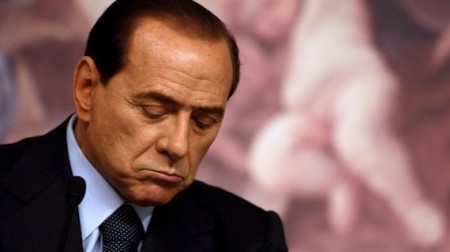
Berlusconi sat at the Parliament from 1994,the year of his first election. Since then,he held four legislatures as Prime Minister of Italy,which granted him the record for the longer investiture on the Italian political scene since 1861,after Benito Mussolini and Giovanni Giolitti. An honorable career,if we fail to recall that he was investigated,and impeached,in more than twenty legal procedures;none of which saw a definitive sentence.
One could legitimately inquire how this was possible. In looking for an answer I asked Dr. Raoul Kirchmayr,an Italian in between countries like myself,to give me his point of view on Berlusconi. A member of the équipe Sartre at the Institut des Textes et Manuscrits (ITEM) at the Ecole Normale of Paris,he made an effort to explain what Italian contemporary history felt like.
“Italy lived throughout 17 years in which what we call ‘belusconismo’was the dominant subculture. In the whole,the new political men who governed the country,after the end of the First Republic in 1994,were able to distinct themselves for the grade of incompetency,lack of institutional sense,arrogance and deficiency in political culture.[...] Berlusconi has been the embodiment of a part of Italy that rooted for evil and riches,who continued to milk the country for their own interests and against the common good. The media power offered by the TV channels – the private ones that Berlusconi already owned,and the public ones upon which he forced himself – gave him the power to create an imaginary reality,in which the Italians mirrored and identified themselves.”
As this agenda setter stepped down,he was called ‘the biggest victim of the economics’by friends and some journalists. Is this the way Berlusconi will be remembered? Is Italy already at work to promote amnesia – as it already happened with the revisionist trend trying to unwrap the Fascist’s era in the pink? Is the court,now afraid to crumble down with its king,propagating this version of the story?
Pondering over these questions,it might be worthy to recall that Berlusconi seems to have lost his crown,but he certainly remains one of the best possible embodiments of a long lasting culture of criminal syndicalism born by the marriage of unrelenting fascism,patronage and graft.
There was a time when something called Propaganda Due,or P2,existed in Italy. It was a Masonic lodge that became a “shadow government”promoting far right politics,and operated illegally from 1976 to 1981. The most famous men linked to it are Licio Gelli,its Venerable Master who called it «l’ Istituzione» (the institution),and Silvio Berlusconi,card number 1816 (1978).
P2 was implicated in numerous Italian crimes,and it came to light through the investigations into the collapse of Michele Sindona’s financial empire,a banker linked to the Mafia. One of P2 most intriguing design was the “Plan for Democratic Rebirth”;a political programme whose manifesto was found by the police in 1981. It called for a consolidation of the media,suppression of trade unions,and the rewriting of the Italian Constitution.
Interesting enough,when Gelli spoke about Berlusconi in an interview to the Italian newspaper Indipendente,in February 1996,he was intransigent:“He took our plan of rebirth and copied it.” Such plan dictated the use of financial power for the rebirth of two movements,one on the right and one of the left,which would feed a vast net of promotional clubs. In order to enforce the idea,10 milliard Lire were to be thrown into the Democrazia Cristiana,to buy off the party itself;10 milliard more and the party were to be broken,and a free trade confederation created.
As far as the media was concerned,Gelli stated,“it was necessary to enlist two or three elements for each newspaper or magazine,nobody would have to know the others”,as they had to support the politicians affiliated with the plan. He continued with a list of ideas that Berlusconi did put into action:“To buy some weekly newspapers”,“to coordinate all the provincial and local press with a centralized agency”,“to coordinate cable TV with the agency for the local press”,“to dissolve Rai (Italian State Television broadcasts) in the name of ‘aerial freedom’;all of this to “control the public opinion” of the country.
Now,as the former Prime Ministers stepped down,this slice of Italian history is destined to the bin;time flies,and political memory is short these days as the economic crisis dictates the news.
One should never forget,however,that Italy tend to recycle trusted men;as in the case of Gelli,who arrived at the top of the P2 due to a career as Fascist,double agent with the Resistance,collaborator with the British and American secret services,and finally Italian secret agent. A willing public servant of the double state,he embraced the non Orthodox war against communism,and moved along so to form the P2 in 1976;an institution that assumed a flexible attitude in the occupation of key political points in Italy,and a business like philosophy that paid back well. As it might appear,it was just the right time for Berlusconi to come along.
History will write its pages,and they might vary depending on the agenda guiding the historian. Nevertheless,there is one grim truth that nobody can toss away,as Dr. Kirchmayr put it:“the most dramatic damage he [Berlusconi] inflicted on Italy is not the financial or administrative one,but the undermining of the Italian cultural basis for a civil life.”